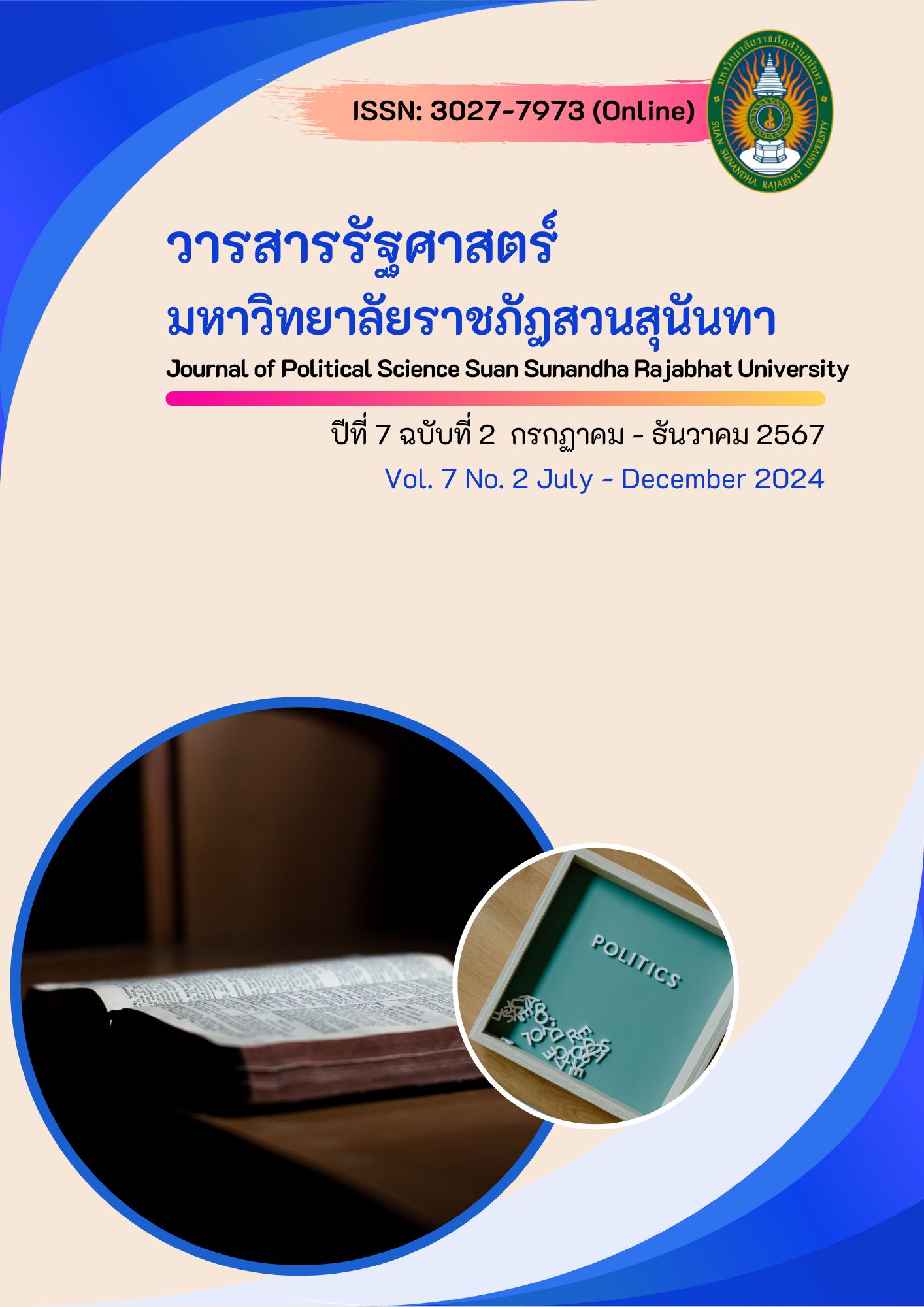ภาวะผู้นำ การแบ่งปันองค์ความรู้ บรรยากาศในองค์การ พฤติกรรมการสร้างสรรค์นวัตกรรมในการทำงานที่มีผลต่อประสิทธิภาพการทำงานของพนักงานธุรกิจก่อสร้างในประเทศไทย
Main Article Content
บทคัดย่อ
การวิจัยครั้งนี้ มีวัตถุประสงค์เพื่อ 1) ศึกษาระดับภาวะผู้นำ การแบ่งปันองค์ความรู้ บรรยากาศในองค์การ พฤติกรรมการสร้างสรรค์นวัตกรรมในการทำงาน และประสิทธิภาพในการทำงานของพนักงานในธุรกิจก่อสร้างในประเทศไทย 2) ศึกษาอิทธิพลของของตัวแปรภาวะผู้นำ การแบ่งปันองค์ความรู้ บรรยากาศในองค์การ พฤติกรรมการสร้างสรรค์นวัตกรรมในการทำงานที่มีผลต่อประสิทธิภาพในการทำงานของพนักงานในธุรกิจก่อสร้างในประเทศไทย 3) สร้างแบบจำลองประสิทธิภาพในการทำงานของพนักงานในธุรกิจก่อสร้างในประเทศไทย งานวิจัยนี้ใช้การวิจัยแบบผสมผสาน ในการวิจัยเชิงปริมาณ กลุ่มตัวอย่าง คือพนักงานระดับหัวหน้าในองค์กรธุรกิจผู้ประกอบการธุรกิจก่อสร้างในประเทศไทย จำนวน 380 คน ใช้วิธีการสุ่มกลุ่มตัวอย่างแบบเจาะจง ใช้แบบสอบถามในการเก็บข้อมูล วิเคราะห์ข้อมูลด้วยแบบจำลองสมการโครงสร้าง ส่วนการวิจัยเชิงคุณภาพใช้วิธีการสัมภาษณ์แบบเจาะจงเชิงลึก กลุ่มผู้ให้ข้อมูลหลักคือผู้บริหาร พนักงานระดับหัวหน้างาน และผู้ประกอบการธุรกิจรับเหมาก่อสร้างในประเทศไทย รวมจำนวน 20 คน
ผลการวิจัยพบว่า 1) ภาวะผู้นำ การแบ่งปันองค์ความรู้ บรรยากาศในองค์การ พฤติกรรมการสร้างสรรค์นวัตกรรมในการทำงาน และประสิทธิภาพในการทำงานของพนักงานในธุรกิจก่อสร้างในประเทศไทย อยู่ในระดับมาก 2) ภาวะผู้นำ การแบ่งปันองค์ความรู้ บรรยากาศในองค์การ พฤติกรรมการสร้างสรรค์นวัตกรรมในการทำงานที่มีผลต่อประสิทธิภาพในการทำงานของพนักงานในธุรกิจก่อสร้างในประเทศไทย อย่างมีนัยสำคัญทางสถิติที่ระดับ .05 และ 3) สร้างแบบจำลองประสิทธิภาพในการทำงานของพนักงานในธุรกิจก่อสร้างในประเทศไทย ที่ผู้วิจัยพัฒนาขึ้น มีชื่อว่า LICK Model (L = Leadership, I = Innovation Work Behavior, C = Climate, K = Knowledge Sharing) นอกจากนี้ผลการวิจัยเชิงคุณภาพยังพบว่า ในการเพิ่มประสิทธิภาพในการทำงานของพนักงานในธุรกิจก่อสร้างในประเทศไทยนั้น ผู้ประกอบการต้องมีการยกระดับและฝึกฝนทักษะแก่พนักงานในรูปแบบการเรียนรู้แบบดิจิทัลและการนำนวัตกรรมเทคโนโลยีก่อสร้างมาช่วยให้สามารถปรับตัวทำงานในรูปแบบใหม่ ๆ ได้อย่างมีประสิทธิภาพ ผลของงานวิจัยนี้สามารถนำไปปรับใช้เป็นแนวทางกำหนดนโยบายเพื่อส่งเสริมประสิทธิภาพในการทำงานของพนักงานในธุรกิจก่อสร้างในประเทศไทยให้มีศักยภาพสูงขึ้นต่อไปในอนาคต
Article Details
เอกสารอ้างอิง
ประเวช ชุ่มเกษรกูลกิจ และศจีมาจ ณ วิเชียร. (2561). พฤติกรรมสร้างนวัตกรรมในการทำงาน: แนวคิด ปัจจัยเชิงสาเหตุ ความท้าทาย. วารสารพฤติกรรมศาสตร์เพื่อการพัฒนา, 10(1), 25-41.
ธนาคารกรุงศรีอยุธยา วิจัยกรุงศรี. (2567). แนวโน้มธุรกิจ/อุตสาหกรรม ปี 2567-2569: ธุรกิจรับเหมาก่อสร้าง. ค้นเมื่อ 30 เมษายน 2567 จาก https://www.krungsri.com/th/research/industry/industry-outlook/construction-construction-materials/construction-
contractors/io/construction-contractor-2024-2026
ธนะพัฒน์ วิริต. (2566). ปัจจัยที่มีอิทธิพลต่อความสำเร็จการดำเนินธุรกิจรับเหมาก่อสร้างขนาดกลางและขนาดย่อมภายใต้สถานการณ์การแพร่ระบาดโรคโควิด-19 ของผู้ประกอบการในจังหวัดปทุมธานี. วารสารวิชาการ การจัดการภาครัฐและเอกชน, 5(1), 128–142.
Afsar, B., & Masood, M. (2018). Transformational Leadership, Creative Self-Efficacy, Trust in Supervisor, Uncertainty Avoidance, and Innovative Work Behavior of Nurses. The Journal of Applied Behavioral Science, 54(1), 36-61.
Kurdi, M. S., Katikar, M. D., Ahuja, V., & Sharma, R. (2020). Striding towards the pinnacles of professional growth, scientific epitome, and leadership: India's women anaesthesiologists. Indian Journal of Anaesthesia, 64(9), 739-742.
Lonati, S. (2020). What explains cultural differences in leadership styles? On the agricultural origins of participative and directive leadership. The Leadership Quarterly, 31(2), 101305.
Montani, F., Vandenberghe, C., Khedhaouria, A., & Courcy, F. (2020). Examining the inverted U-shaped relationship between workload and innovative work behavior: The role of work engagement and mindfulness. Human Relations, 73(1), 59-93.
Mukherjee, S., & Mulla, Z. R. (2022). Empowering and directive leadership: The cost of changing styles. Business perspectives and research, 10(2), 251-266.
Novitasari, D., Asbari, M., & Purwanto, A. (2022). Tourist satisfaction and performance of tourism industries: how the role of innovative work behaviour, organizational citizenship behaviour?. Journal of Industrial Engineering & Management Research, 3(1), 1-12
Obrenovic, B., Jianguo, D., Khudaykulov, A., & Khan, M. A. S. (2020). Work-family conflict impact on psychological safety and psychological well-being: A job performance model. Frontiers in psychology, 11, 475.
Paais, M., & Pattiruhu, J. R. (2020). Effect of motivation, leadership, and organizational culture on satisfaction and employee performance. The Journal of Asian Finance, Economics and Business, 7(8), 577-588.
Purwanto, A. (2020). The impacts of leadership and culture on work performance in service company and innovative work behavior as mediating effects. Journal of Reseacrh in Business, Economics, and Education. ? Retrieved April 30, 2024 from DOI:10.13140/RG.2.2.20095.36001
Rico, R., Uitdewilligen, S. G., & Dorta, D. (2022). Patterns of team adaptation: The effects of behavioural interaction patterns on team adaptation and the antecedent effect of empowering versus directive leadership. Journal of Contingencies and Crisis Management, 30(4), 365-378.
Rasool, S. F., Wang, M., Tang, M., Saeed, A., & Iqbal, J. (2021). How toxic workplace environment effects the employee engagement: The mediating role of organizational support and employee wellbeing. International journal of environmental research and public health, 18(5), 2294.
Si, S. & Chen, H. (2020). A Literature Review of Disruptive Innovation: What It Is, How It Works and Where It Goes. Journal of Engineering and Technology Management, 56, Article ID: 101568. from https://doi.org/10.1016/j.jengtecman.2020.101568
Vuong, K. T., Rajagopal, S., Singh, H., & Rajagopal, P. (2019). The effect of leadership styles and the mediating role of the quality of work-life on employee job performance in Vietnamese enterprises in Ho Chi Minh City. Management Dynamics in the Knowledge Economy, 7(4), 535-552.
Zheng, W., Meister, A., & Caza, B. B. (2021). The stories that make us: Leaders’ origin stories and temporal identity work. Human Relations, 74(8), 1178-1210.


